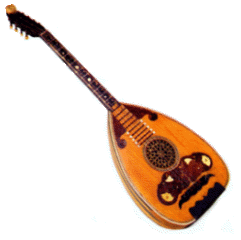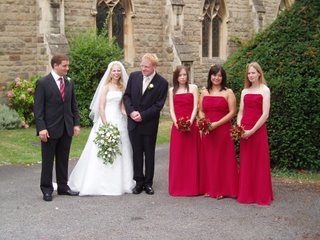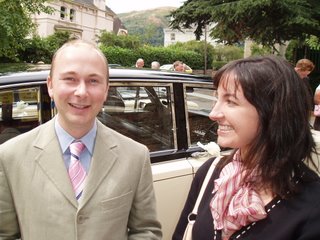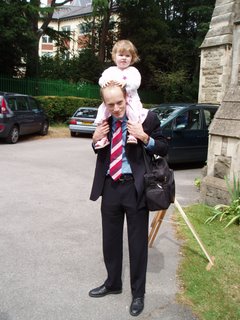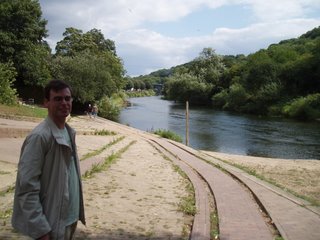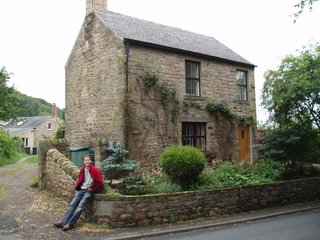Not a good view on April 16 1746.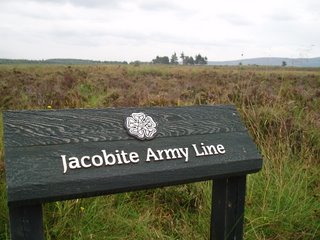 Our guide demonstrates the weaponry:
Our guide demonstrates the weaponry: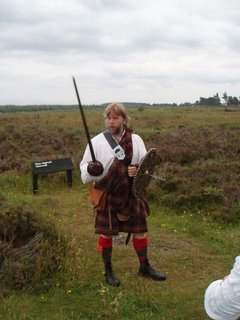 Not a drop drunk from it since:
Not a drop drunk from it since: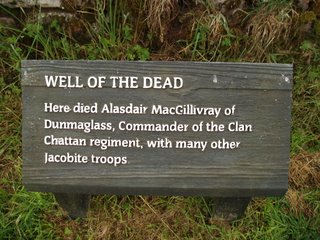
Finally got around to going to Culloden the day of the housewarming. This is quite a brave thing to do for an English man round these parts! I must say that it was an excellent day out, made all the better by the fact that we bit the bullet and paid for not only the guided tour of the battlefield, but also for the separate exhibition/museum, as both were excellent.
Despite being warm the day was overcast, and this only added to the gloomy atmosphere of the desolate field. The numbers are incredible, 9,000 Redcoats (2,500 being Scottish) and around 5,000 Jacobites met on the field on April 16 1746. The Jacobites were exhausted due to a failed attempt to reach and attack Cumberland's camp in the night, and due to Bonnie Prince Charlie not having arranged food for this day, as the battle had been expected the day before. Cumberland's troops in sharp contrast were well-fed and well-trained.
Now, essentially, all of this came about because of power and the desire for it. Yes, there had been suppression, which had given the Jacobite cause such a following, but it was one man's desire for the crown on the one side and one man's desire to keep it on the other. However, that aside, Culloden
is justly emotive for the Scottish because of what happened on that day and following on from it. Cumberland (later to be called 'The Butcher') had obtained a copy of the Jacobite battle orders, and he distributed it amongst his men, but with one fake line added, 'To give the enemy no quarter' (no mercy). With this in mind, the Redcoats were given the same order, and carried it out to the letter following the battle. For the battle went as expected, although it very well might not have done if some events had been different. For example, Bonnie Prince Charlie had fallen out with his chief military advisor and so did not heed the advice to have the battle on the hills nearby, thus giving the smaller Jacobite force a height advantage. The moor was chosen by his inexperienced friend O'Sullivan. The boggy ground greatly hampered the fiercesome highland charge, causing separate divisions to run into each other as they tried to avoid uneven ground. In any case, the Jacobites were soon in retreat and the Redcoats advanced, and anyone found on the battlefield was slaughtered, with bayonettes, gun-butts, and boots. This included innocent bystanders, women and children. A barn where injured Jacobites had been placed was locked and burnt to the ground. As part of the highland clearences, as well as many other new laws, Gaelic and bagpipe-playing were banned; an entire culture was made unlawful. Such English over-reaction is mirrored more recently in Ireland.
Given this, it's easy to understand Scottish nationalism, even after 250+ years as that is only a handful of generations, but it should still be kept in the world of the rational. When an English fan is dragged out of his car and beaten due to his little flag, or a man on Union Street set upon by 11 because of his shirt, then this is the behaviour of idiots, albeit Scottish ones. I am one of the world's biggest non-football fans, but if England get to the final few games in a tournament, I will start to take an interest. I do whole-heartedly agree that the coverage, arrogance and hype that goes along with them is hideous and for this reason alone, I do love being up here all the more when these things take place. Due to this I get along with Scots who want any team playing England to win, although I admit I do find it a little sad. I guess what I'm trying to say is that the origins of this nationalism should be kept in mind by both 'sides', but we should take care that we don't embark on the slippery slope to sectarianism.
On a final note, if the Jacobites had won, we'd all be Catholic by now.
I'm going to killed aren't I?
Discuss.
